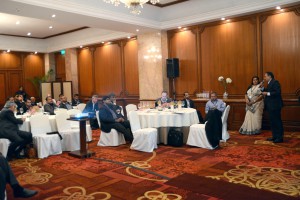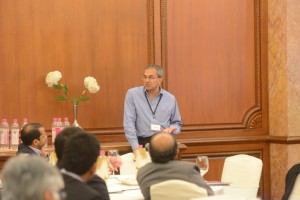12th February 2013 New Delhi, India
How smart is your power?
Did you know that the Indian network operators have an average generating shortfall of 7% (peak >10%) and power demand is growing by 7% per annum, resulting in many areas receiving power for only 6-8hrs per day? I got to learn many such interesting facts when I met a group of organisations involved in Smart Grids and Power Electronics from India and the UK. It was my first week at work after a year-long maternity leave and I had the pleasure of attending RiffStream#Delhi – Creating Smart Power Solutions: Catalysing UK-India collaborations to address India’s energy challenge.
The event was organised by the UK Energy Generation & Supply (EGS) KTN, the Electronics, Sensors & Photonics (ESP) KTN, the UK Technology Strategy Board (TSB), the UK Science & Innovation Network (UK-SIN), and AcceleratorIndia.

The event opened with remarks from Mark Sinclair, Head of SIN India followed by an overview from Ritika Goel from Energy, Climate and Growth Unit at DFID-India. Dr Uday Phadke, who was the curator of the event, encouraged the participants to interact and ask questions during the presentations.
My favorite bit of the event was the use of #RiffStream technology, a methodology developed by Dr Phadke to maximise the value of networking and accelerate new business creation. The methodology is based upon a musical metaphor, to provide an interactive environment where players from different disciplines can interact to synthesise and test new ideas and relationships with other participants.
Keynote Presentations on Perspectives, Challenges & Opportunities in Smart Power were made by Paul Huggett from Electronics, Photonics and Sensors KTN ; Simon Daniel who is the CEO of Moixa Energy and Rajesh Bansal, VP, BSES Rajdhani Power Limited. All the presentations and videos will be uploaded on the #RiffStream Delhi website.
Despite a rich lunch buffet at the Taj Mahal hotel, we weren’t sleepy, thanks to short, focused sessions that explored the challenges in the power sector and focused on commercial collaboration opportunities.

Many of the companies present told us about their market-ready products and services. They ranged from portable power systems, inverter & storage technology, hybrid wind and solar systems, renewable energy systems for telecom towers, advanced power electronics for electricity grids and even analytical tools for electricity distribution networks. The workshop also featured pitches from UK and Indian ventures that were looking for partners and collaborators.
Senior managers and decision makers from Indian power utilities, regulatory bodies, ecosystem players and influencers also participated and shared insights on the challenges they face.
The event had a great turnout, and what made people stay till the very end was the relaxed and friendly atmosphere with sufficient time for interaction. I had some very interesting and provocative discussions with some of the participants during the networking break.
The event offered Indian and UK companies the opportunity to gain a better understanding of Indian and UK eco-systems and provided a platform to build relationships with potential suppliers, partners and customers.
Our overall aim for the workshop was to generate new collaborations and projects as the basis for delivering innovation between the UK and India in the power sector. Several UK companies found suitable Indian partners so we’re looking forward to hearing about new collaborations as a result of the event – we’ll keep you posted. Positive feedback from delegates brought the event to a promising end.
Further reading